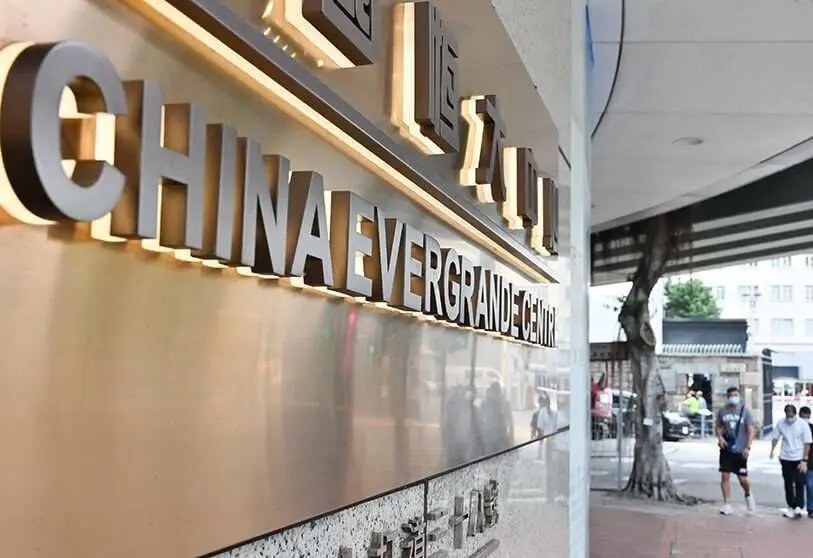Evergrande: China's potential "Lehman moment"?

The credit crisis at giant property developer Evergrande is rocking global financial markets. Evergrande is China's second largest of its kind, with a huge outstanding debt of $300 billion. According to press reports, the company is struggling to pay interest on its liabilities as it falls short of cash inflows from its assets. Investors are rushing to exit in the event of a default, causing Evergrande's share and bond prices to plummet. In turn, the liquidation has affected stock and bond markets globally. And rightly so, because the "contagion problem" is real.
The Evergrande debacle could herald the bursting of the Chinese property bubble, which has been feared for years. Perhaps it is not only Evergrande that has got into financial trouble, but other property developers as well? If so, the ramifications for almost every industry can be expected to have far-reaching consequences. Not only would it cause a serious setback to the economic cycle. The need to liquidate (or fire-sell) construction projects could even trigger a fall in residential property prices. This, in turn, could easily lead to painful loan defaults for banks.
In such a case, it is very likely that the credit market will dry up and that many borrowers will suddenly find themselves in a desperate situation: when trying to roll over their overdue debt, they will face significantly higher borrowing costs, or creditors may no longer be found to provide the financing they urgently need. As more and more debtors struggle to service their debt, the credit-driven boom turns into bust. Economist Murray Rothbard puts it succinctly. He wrote in 1973:
"Like the repeated doping of a horse, the boom is kept on track and ahead of its inevitable vengeance by repeated and accelerated doses of the stimulant of bank credit. Only when bank credit expansion must finally stop or slow down abruptly, either because the banks are faltering or because the public becomes restless in the face of continuing inflation, does retribution finally catch up with the boom. As soon as the credit expansion comes to a halt, the price will have to be paid, and the inevitable readjustments will have to liquidate the unsound overinvestments of the boom and reorient the economy towards the production of consumer goods. And, of course, the longer the boom continues, the more disinvestments will have to be liquidated, and the more distressing the readjustments that will have to be made".
And that is what investors should really be concerned about: the danger that Evergrande's credit crisis could be the starting point for a new global credit crisis. The Evergrande debacle could serve as a reminder that the global economic and financial system is literally built on credit, fuelled by a huge credit surge since the early 2020s. If investors become concerned about the quality of outstanding debt and lose confidence in the ability and willingness of borrowers to service their debt, all hell would break loose. If the flow of credit dries up, consumption and investment will be hit hard, and financial asset prices are likely to plummet.
The failure of the US bank Lehman Brothers in September 2008 triggered a credit crunch that became the biggest financial and economic crisis since the "Great Depression" of 1929-33. The key question now is: will the Communist Party of China (CPC) step in and rescue Evergrande? On the one hand, the CCP wants to make the economy less credit-dependent by boosting the deleveraging of the economy. On the other hand, deliberately allowing an Evergrande credit event with its incalculable contagion and spillover effects could be politically counterproductive.
If the crises of 2008/2009 and 2020 taught us anything, it is this: the storm of a credit crunch could all too easily turn into a hurricane that could bring the economy and financial markets to their knees; and that such a scenario would be inevitable without government intervention in the form of a central bank rate cut, an increase in the quantity of money and the underwriting of credit risk. Against this backdrop, if the storm worsens, it is reasonable to assume that the CCB will intervene at some point to avert the worst, the hurricane.
While investors in stocks, bonds and housing may find relief in this prospect, the uncomfortable truth would be that inflationary policies will intensify not only in the US and Europe, but also in China. Any government-sponsored rescue from a credit crunch would have to be based on a substantial increase in the quantity of money, and an increase in the quantity of money will translate into an increase in asset prices, whether of consumers, producers and/or assets. That said, the over-leveraged economic and financial system is paving the way for rising price inflation.
It cannot be ruled out that Evergrande will become the "Chinese Lehman" moment. At the same time, such an unfortunate outcome could be avoided, or at least contained, by an early and decisive rescue by the CCP that starts up the People's Bank of China's electronic printing presses. In any case, investors will want to hedge against the risk of central banks around the world increasingly resorting to inflation to prevent the collapse of the credit pyramid they have built up over the past decades.
Physical gold and silver come to mind. The exchange power of these precious metals cannot be debased by monetary policy. Nor do they carry a default or counterparty risk. Especially for long-term oriented investors, holding physical gold and silver as part of their liquid portfolio should be profitable, as, in the coming years, they can be expected to reduce risk and increase returns. The current Evergrande debacle may or may not be easily overcome. In any case, it should be seen as a kind of precursor of what the credit-driven global monetary system still has in store for us.


